- Home
- Alice Munro
Too Much Happiness Page 10
Too Much Happiness Read online
Page 10
“Well, I have to keep doing those things,” said Sally.
“Nursing’s not one of the things you have to do. You could have her on the bottle tomorrow.”
“I will soon. Not quite tomorrow, but soon.”
But here she is, still letting Savanna and the milk jugs dominate the picnic.
The Kool-Aid is poured, then the champagne. Sally and Alex touch glasses, with Savanna in their way. Sally has her sip and wishes she could have more. She smiles at Alex to communicate this wish, and maybe the wish that it would be nice to be alone with him. He drinks his champagne, and as if her sip and smile had been enough to soothe him, he starts in on the picnic. She instructs him as to which sandwiches have the mustard he likes and which have the mustard she and Peter like and which are for Kent who likes no mustard at all.
While this is going on, Kent manages to slip in behind her and finish up her champagne. Peter must have seen him do this, but for some peculiar reason he does not tell on him. Sally discovers what has happened sometime later and Alex never knows about it at all, because he soon forgets there was anything left in her glass and packs it neatly away with his own, while telling the boys about dolomite. They listen, presumably, while they gobble up the sandwiches and ignore the devilled eggs and crab salad and grab the tarts.
Dolomite, Alex says. That is the thick caprock they see. Underneath it is shale, clay turned into rock, very fine, fine grained. Water works through the dolomite and when it gets to the shale it just lies there, it can’t get through the thin layers, the fine grain. So the erosion—that’s the destruction of the dolomite—works and works its way back to the source, eats a channel back, and the caprock develops vertical joints; do they know what vertical means?
“Up and down,” says Kent lackadaisically.
“Weak vertical joints, and they get to lean out and then they leave crevasses behind them and after millions of years they break off altogether and go tumbling down the slope.”
“I have to go,” says Kent.
“Go where?”
“I have to go pee.”
“Oh for God’s sake, go.”
“Me too,” says Peter.
Sally clamps her mouth down on the automatic injunction to be careful. Alex looks at her and approves of the clamping down. They smile faintly at each other.
Savanna has fallen asleep, her lips slack around the nipple. With the boys out of the way, it’s easier to detach her. Sally can burp her, settle her on her blanket, without worrying about an exposed breast. If Alex finds the sight distasteful—she knows he does, he dislikes the whole conjunction of sex and nourishment, his wife’s breast turned into udders—he can look away, and he does.
As she buttons herself up there comes a cry, not sharp but lost, diminishing, and Alex is on his feet before she is, running along the path. Then a louder cry getting closer. It’s Peter.
“Kent falled in. Kent falled in.”
His father yells, “I’m coming.”
Sally will always believe that she knew at once, even before she heard Peter’s voice she knew what had happened. If any accident happened it would not be to her six-year-old who was brave but not inventive, not a show-off. It would be to Kent. She could see exactly how. Peeing into the hole, balancing on the rim, teasing Peter, teasing himself.
He was alive. He was lying far down in the rubble at the bottom of the crevasse, but he was moving his arms, struggling to push himself up. Struggling so feebly. One leg caught under him, the other oddly bent.
“Can you carry the baby?” she said to Peter. “Go back to the picnic and put her down and watch her. That’s my good boy. My good strong boy.”
Alex was getting down into the hole, scrambling down, telling Kent to stay still. Getting down in one piece was just possible. It would be getting Kent out that was hard.
Should she run to the car and see if there was a rope? Tie the rope around a tree trunk. Maybe tie it around Kent’s body so she could lift him when Alex raised him up to her.
There wouldn’t be a rope. Why should there be a rope?
Alex had reached him. He bent and lifted him. Kent gave a beseeching scream of pain. Alex draped him around his shoulders, head hanging down on one side and useless legs—one so oddly protruding—on the other. He rose, stumbled a couple of steps, and while still hanging on to Kent dropped onto his knees. He had decided to crawl, and was making his way—Sally could understand this now—to the rubble which partly filled the far end of the crevasse. He shouted some order to her without raising his head, and though she could not make out a single word she understood. She got up off her knees—why was she on her knees?—and pushed through some saplings to the rim where the rubble came to within perhaps three feet of the surface. Alex was crawling along with Kent dangling from him like a shot deer.
She called, “I’m here. I’m here.”
Kent would have to be raised up by his father, pulled to the solid shelf of rock by his mother. He was a skinny boy who had not yet reached his first spurt of growth, but he seemed heavy as a bag of cement. Sally’s arms could not do it on the first try. She shifted her position, crouching instead of lying flat on her stomach, and with the whole power of her shoulders and chest and with Alex supporting and shoving Kent’s body from behind they heaved him over. Sally fell back with him in her arms and saw his eyes open, roll back in his head as he fainted again.
When Alex had clawed and heaved his way out they collected the other children and drove to the Collingwood Hospital. There seemed to be no internal injury. Both legs were broken. One break was clean, as the doctor put it; the other leg was shattered.
“Kids have to be watched every minute in there,” he said to Sally, who had gone in with Kent while Alex managed the other children. “Haven’t they got any warning signs up?”
With Alex, she thought, he would have spoken differently. That’s the way boys are. Turn your back and they’re tearing around where they shouldn’t be. “Boys will be boys.”
Her gratitude—to God, whom she did not believe in, and Alex, whom she did—was so immense that she resented nothing.
It was necessary for Kent to spend the next half year out of school, strung up for the first while in a rented hospital bed. Sally picked up and took back his school assignments, which he completed in no time. Then he was encouraged to go ahead with Extra Projects. One of these was Travels and Explorations—Choose Your Country.
“I want to pick what nobody else would pick,” he said.
Now Sally told him something she had not told to another soul. She told him how she was attracted to remote islands. Not to the Hawaiian Islands or the Canaries or the Hebrides or the Isles of Greece, where everybody wanted to go, but to small or obscure islands nobody talked about and which were seldom if ever visited. Ascension, Tristan da Cunha, Chatham Islands, and Christmas Island and Desolation Island and the Faeroes. She and Kent began to collect every scrap of information they could find about these places, not allowing themselves to make anything up. And never telling Alex what they were doing.
“He would think we were off our heads,” said Sally.
Desolation Island’s main boast was of a vegetable of great antiquity, a unique cabbage. They imagined worship ceremonies for it, costumes, cabbage parades in its honor.
And before he was born, Sally told her son, she had seen on television the inhabitants of Tristan da Cunha disembarking at Heathrow Airport, having all been evacuated due to a great earthquake on their island. How strange they looked, docile and dignified, like human creatures from another century. They must have adjusted to London, more or less, but when the volcano quieted down they wanted to go home.
When Kent could go back to school things changed, of course, but he still seemed old for his age, patient with Savanna who had grown venturesome and stubborn, and with Peter who always burst into the house as if on a gale of calamity. And he was especially courteous to his father, bringing him the paper that had been rescued from Savanna and carefully refolde
d, pulling out his chair at dinnertime.
“Honor to the man who saved my life,” he might say, or, “Home is the hero.”
He said this rather dramatically though not at all sarcastically. Yet it got on Alex’s nerves. Kent got on his nerves, had done so even before the deep-hole drama happened.
“Cut that out,” he said, and complained privately to Sally.
“He’s saying you must have loved him, because you rescued him.”
“Christ, I’d have rescued anybody.”
“Don’t say that in front of him. Please.”
When Kent got to high school things improved with his father. He chose to study science. He picked the hard sciences, not the soft earth sciences, and even this roused no opposition in Alex. The harder the better.
But after six months at college Kent disappeared. People who knew him a little—there did not seem to be anyone claiming to be a friend—said that he had talked of going to the West Coast. And a letter came, just as his parents were deciding to go to the police. He was working in a Canadian Tire store in a suburb just north of Toronto. Alex went to see him there, to order him back to his education. But Kent refused, said he was very happy with the job he had now, and was making good money, or soon would be, as he got promoted. Then Sally went to see him, without telling Alex, and found him jolly and ten pounds heavier. He said it was the beer. He had friends now.
“It’s a phase,” she said to Alex when she confessed the visit. “He wants to get a taste of independence.”
“He can get a bellyful of it as far as I’m concerned.”
Kent had not told her where he was living, but it did not matter, because when she made her next visit she was told that he had quit. She was embarrassed—she thought she caught a smirk on the face of the employee who told her that—and she did not ask where Kent had gone. She thought he would get in touch, anyway, as soon as he had settled again.
He did that, three years later. His letter was mailed in Needles, California, but he told them not to take the trouble to trace him there—he was only passing through. Like Blanche, he said, and Alex said, Who the hell is Blanche?
“Just a joke,” said Sally. “It doesn’t matter.”
Kent did not say what he was working at or where he had been or whether he had formed any connections. He did not apologize for leaving them so long without any information or ask how they were, or how his brother and sister were. Instead he wrote pages about his own life. Not the practical side of his life but what he believed he should be doing—what he was doing—with it.
“It seems so ridiculous to me,” he said, “that a person should be expected to lock themselves into a suit of clothes. I mean like the suit of clothes of an engineer or a doctor or a geologist and then the skin grows over it, over the clothes, I mean, and that person can’t ever get them off. When we are given a chance to explore the whole world of inner and outer reality and to live in a way that takes in the spiritual and the physical and the whole range of the beautiful and the terrible available to mankind, that is pain as well as joy and turmoil. This way of expressing myself may seem overblown to you, but one thing I have learned to give up is intellectual pridefulness—”
“He’s on drugs,” said Alex. “You can tell a mile off. His brain’s rotted with drugs.”
In the middle of the night he said, “Sex.”
Sally was lying beside him wide awake.
“What about sex?”
“That’s what makes you get into that state he’s talking about. Become a something-or-other so you can earn a living. So you can pay for your steady sex and the consequences. That’s not a consideration for him.”
Sally said, “My, how romantic.”
“Getting down to basics is never very romantic. He’s not normal, is all I’m trying to say.”
Further on in the letter—or the rampage, as Alex called it—Kent had said that he had been luckier than most people in having what he called his near-death experience, which had given him an extra awareness, and for this he must be forever grateful to his father who had lifted him back into the world and his mother who had lovingly received him there.
“Perhaps in those moments I was reborn.”
Alex had groaned.
“No. I won’t say it.”
“Don’t,” said Sally. “You don’t mean it.”
“I don’t know whether I do or not.”
That letter, signed with love, was the last they had heard from him.
Peter went into medicine, Savanna into law.
Sally became interested in geology, to her own surprise. One time, in a trusting mood after sex, she told Alex about the islands—though not about her fantasy that Kent was now living on one or another of them. She said that she had forgotten many of the details she used to know, and that she should look all these places up in the encyclopedia where she had first got her information. Alex said that everything she wanted to know could probably be found on the Internet. Surely not something so obscure, she said, and he got her out of bed and downstairs and there in no time before her eyes was Tristan da Cunha, a green plate in the South Atlantic Ocean, with information galore. She was shocked and turned away, and Alex who was disappointed in her—no wonder—asked why.
“I don’t know. I feel now as if I’d lost it.”
He said that this was no good, she needed something real to do. He had just retired from his teaching at this time and was planning to write a book. He needed an assistant and he could not call on the graduate students now as he could when he was still on the faculty. (She didn’t know if this was true or not.) She reminded him that she knew nothing about rocks, and he said never mind that, he could use her for scale, in the photographs.
So she became the small figure in black or bright clothing, contrasting with the ribbons of Silurian or Devonian rock. Or with the gneiss formed by intense compression, folded and deformed by clashes of the American and Pacific plates to make the present continent. Gradually she learned to use her eyes and apply new knowledge, till she could stand in an empty suburban street and realize that far beneath her shoes was a crater filled with rubble never to be seen, that never had been seen, because there were no eyes to see it at its creation or throughout the long history of its being made and filled and hidden and lost. Alex did such things the honor of knowing about them, the very best he could, and she admired him for that, although she knew enough not to say so. They were good friends in these last years, which she did not know were their last years, though maybe he did. He went into the hospital for an operation, taking his charts and photographs with him, and on the day he was supposed to come home he died.
This was in the summer, and that fall there was a dramatic fire in Toronto. Sally sat in front of her television watching the fire for a while. It was in a district that she knew, or used to know, in the days when it was inhabited by hippies with their tarot cards and beads and paper flowers the size of pumpkins. And for a while after that when the vegetarian restaurants were being transformed into expensive bistros and boutiques. Now a block of those nineteenth-century buildings was being wiped out, and the newsman was bemoaning this, speaking of the people who had lived above the shops in old-fashioned apartments and who had now lost their homes, and were being dragged out of harm’s way onto the street.
Not mentioning the landlords of such buildings, thought Sally, who were probably getting away with substandard wiring as well as epidemics of cockroaches and bedbugs, not to be complained about by the deluded or fearful poor.
She sometimes felt Alex talking in her head these days, and that was surely what was happening now. She turned off the fire.
No more than ten minutes later the phone rang. It was Savanna.
“Mom. Have you got your TV on? Did you see?”
“You mean the fire? I did have it on but I turned it off.”
“No. Did you see—I’m looking for him right now—I saw him not five minutes ago. Mom, it’s Kent. Now I can’t find him. But I saw him.”
“Is he hurt? I’m turning it on now. Was he hurt?”
“No, he was helping. He was carrying one end of a stretcher, there was a body on it, I don’t know if it was dead or just hurt. But Kent. It was him. You could even see him limping. Have you got it on now?”
“Yes.”
“Okay, I’ll calm down. I bet he went back in the building.”
“But surely they wouldn’t allow—”
“He could be a doctor for all we know. Oh fuck, now they’re doing that same old guy they talked to before, his family owned some business for a hundred years—let’s hang up and just keep our eyes on the screen. He’s sure to come in range again.”
He didn’t. The shots became repetitive.
Savanna phoned back.
“I’m going to get to the bottom of this. I know a guy that works on the news. I can get to see that shot again, we have to find out.”
Savanna had never known her brother very well—what was all the fuss about? Did her father’s death make her feel the need of family? She should marry, soon; she should have children. But she had such a stubborn streak when she set her mind on something—was it possible she would find Kent? Her father had told her when she was about ten years old that she could gnaw an idea to the bone, she ought to be a lawyer. And from then on, that was what she said she would be.
Sally was overcome by a trembling, a longing, a weariness.
It was Kent, and within a week Savanna had found out all about him. No. Change that to found out all he meant to tell her. He had been living in Toronto for years. He had often passed the building Savanna worked in and had spotted her a couple of times on the street. Once they were nearly face-to-face at an intersection. Of course she wouldn’t have recognized him because he was wearing a kind of robe.

 Runaway
Runaway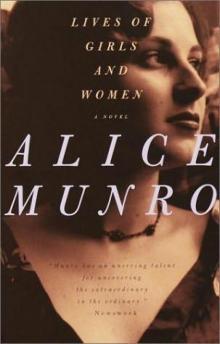 Lives of Girls and Women
Lives of Girls and Women Dance of the Happy Shades
Dance of the Happy Shades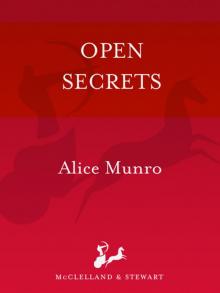 Open Secrets
Open Secrets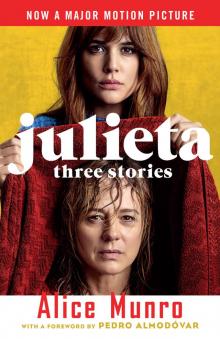 Julieta (Movie Tie-in Edition)
Julieta (Movie Tie-in Edition)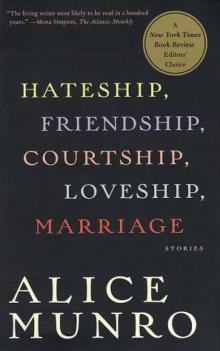 Hateship, Friendship, Courtship, Loveship, Marriage: Stories
Hateship, Friendship, Courtship, Loveship, Marriage: Stories Alice Munro's Best
Alice Munro's Best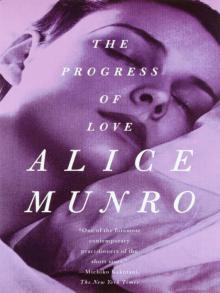 The Progress of Love
The Progress of Love Selected Stories
Selected Stories Away from Her
Away from Her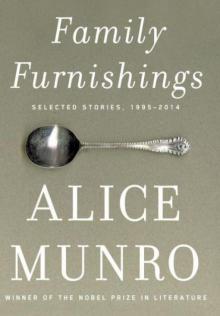 Family Furnishings
Family Furnishings Moons of Jupiter
Moons of Jupiter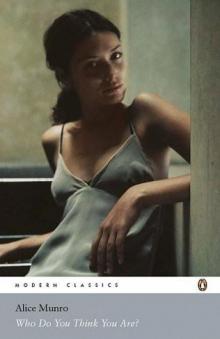 Who Do You Think You Are?
Who Do You Think You Are? Hateship, Friendship, Courtship, Loveship, Marriage
Hateship, Friendship, Courtship, Loveship, Marriage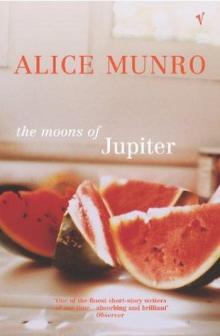 The Moons of Jupiter
The Moons of Jupiter Vintage Munro
Vintage Munro The Love of a Good Woman
The Love of a Good Woman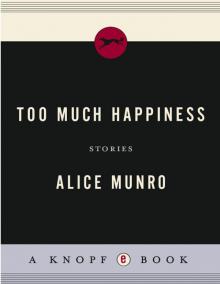 Too Much Happiness
Too Much Happiness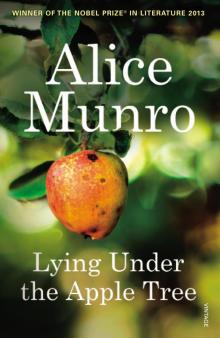 Lying Under the Apple Tree
Lying Under the Apple Tree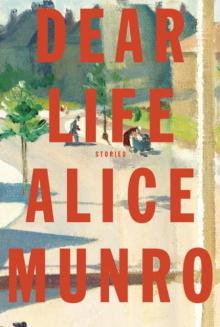 Dear Life
Dear Life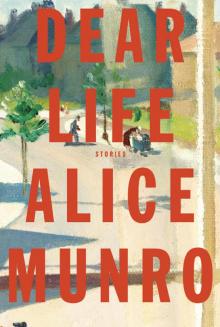 Dear Life: Stories
Dear Life: Stories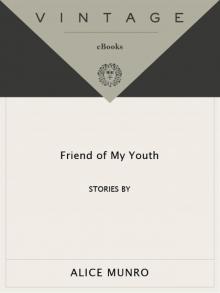 Friend of My Youth
Friend of My Youth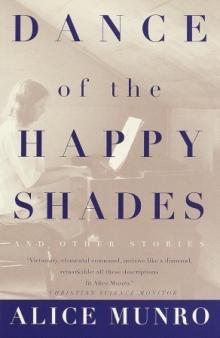 Dance of the Happy Shades: And Other Stories
Dance of the Happy Shades: And Other Stories The Beggar Maid
The Beggar Maid